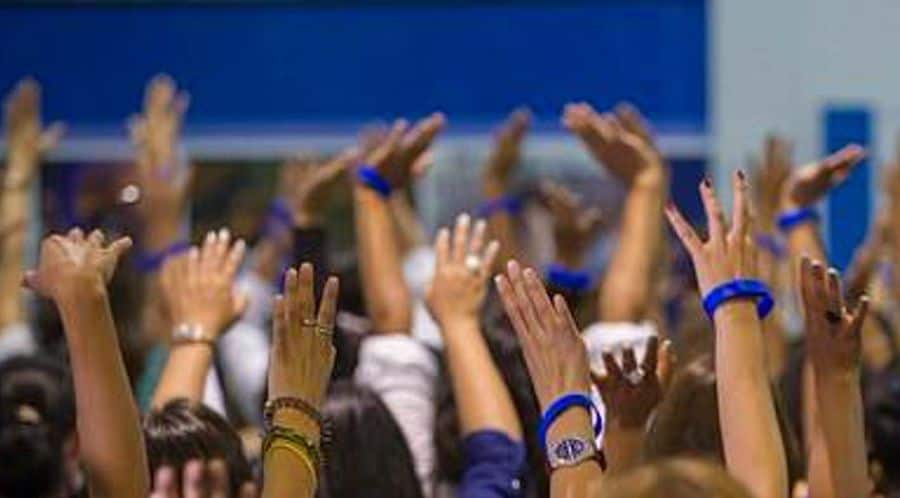Laura Williams, currently the deputy director of IT customer support with the U.S. Department of State, joined the Foreign Service in 2001 as an Information Management Specialist (IMS). The IMS role has evolved into the Diplomatic Technology Officer (DTO) career. Laura sat down with us to answer questions about her experiences as an IT professional in the Foreign Service. and offer advice for students applying for the Foreign Affairs Information Technology (FAIT) Fellowship.
Why did you decide to become an Information Management Specialist (IMS) in the Foreign Service?
What resonated with me [about the Foreign Service] was that where doing development or improving someone’s life seems sort of abstract or hard to attain through a program of food aid or other types of development, fixing a computer when it was broken was very transactional and attainable. I could do that kind of work in an environment that had the same mission focus that I was looking for. I was looking for interaction with other cultures and interaction with folks around the world while fulfilling public service, which is something I knew I wanted to do.
What did you do before you entered the Foreign Service?
Right after school, I got my foot in the door at USAID by working part-time in the library with the research and reference staff. That was a great job because I studied International Development in college. Before joining the Foreign Service as an IT professional in 2001, I had worked as a contractor for the U.S. agency for International Development and also the U.S. Navy.
Where was your first post?
My first post was Nicosia, Cyprus – that’s the little island in the Eastern Mediterranean between Greece and Turkey. Even though it seemed like I was going to a small post, it ended up being bigger than I thought. That’s because of the strategic location of that island and because it’s a great place to live. A lot of our partner agencies would house their headquarters for the region there and then travel from there. We actually had a bigger employee base than you might think for Embassy Nicosia, Cyprus.
Can you tell us about the work you did at your first post?
I really enjoyed it as a first tour because of the medium-sized support base. It wasn’t so small that I had to do all of the things in the portfolio of an information management specialist, which is quite a large set of roles and responsibilities, but I could learn various parts of the portfolio.
Let me give you an example. As an IT professional, I would, of course, be administering the classified and unclassified computer networks. But I also learned how to manage and run the radio program. I didn’t know anything about radios and I learned a lot about them. I learned how important they were as an emergency communication device. I really came to not only learn the technology behind it, but really appreciate how the emergency radio network could support the embassy employees and their families, as well as serve as a communication device between our location in Cyprus and the embassy in Beirut, Lebanon. That experience was a precursor for a much bigger and more important role that I played as an IT professional helping American citizens in their time of need.
What happened when you had to help American citizens in their time of need?
During my third post in Rome, Italy, there was a lot of civil unrest that year in Lebanon, and a major evacuation of 15,000 American citizens. Americans left Lebanon in boats and then arrived on the shores of Cyprus. The State Department was flying airplanes into Cyprus to get the American citizens back to the U.S. We had to come up with a staging ground and logistics to get the American citizens from the shore to a temporary shelter, and then to get them onto airplanes in an orderly fashion. Setting up the emergency and logistical communications to coordinate this was a huge effort. My colleague in Cyprus called me and other colleagues he knew who had previously served in Cyprus because we knew the “lay of the land.” With any kind of civil unrest, it’s very scary for all involved. But to be able to look at these families in the eye and say “we’re going to help you get your documents in order and help you get back to your families and friends in the United States,” there is nothing more meaningful than that. It’s a real honor to use technology to support our diplomatic mission and nothing is more important than supporting our Americans overseas.
What is your most memorable experience that illustrates how your role supported diplomacy?
My fourth overseas tour came after a series of assignments in Washington. By this point, I was married and had a kid, and our whole family, including my cat, moved to Mexico City – and it was an awesome experience. My role there was less traditional I would say. I was running or leading a series of tech camps, which are two-day tech training sessions for members of civil society. For example, one of the series of tech camp programs was targeted for women entrepreneurs throughout Latin America, and we went to Bolivia, Colombia, and El Salvador. We were teaching these women who had small, start-up businesses, such as selling spices or beauty equipment, or they made something they were trying to sell. And we taught them how to use and apply low- or no-cost technology to grow their businesses. The tech camp program was awesome. It was a great way to intersect technology with diplomacy, and certainly, that’s the kind of role that I enjoy.
What is a typical day in the life of an Diplomatic Technology Officer (DTO), formerly IMS?
That’s a tough one because it really can change throughout your career. And it certainly changes from one post to the next depending on how big that post is. Are you at a small consulate where you’re one or two American IT professionals there? Or are you at a large embassy like Baghdad, where you’re one of dozens of IT professionals working and in that space? In a small spot, you’re going to do a little bit of everything. You are going to run that network, you’re going to administer the unclassified and classified computer networks. You’re going to make sure that your emergency communication tools are up to spec, and you’re going to make sure that you lead the country team effort when they’re doing their emergency exercises and planning. You’re going to make sure everybody knows how to use that emergency IT communications equipment. You’re going to have to know a lot about the telephone systems at post. Think about anything that communicates and it’s your job. It can be a little overwhelming if you’re in a small post. But, certainly, if you’re the kind of person who likes to dabble in a little bit of everything, then it’s an awesome experience.
At larger posts where you have the opportunity to specialize in a portfolio, you might be the information systems security officer, and you might be really focused on the security of the data, looking for vulnerabilities on the network, and making sure that you’re mitigating those risks. You may have the time and the space in your portfolio to do some outreach to move outside the embassy wall, and to connect with other students in that country, such as students that are learning how to be IT professionals themselves. You may help our public diplomacy colleagues with programming by going out and talking about how technology can support everyone. Technology is everybody’s job these days, so the more you get to know about the business of diplomacy, the more you’ll be able to really be effective in applying technology to the best end. That’s my number one tip.
What advice do you have for students considering FAIT Fellowship program?
My advice to students is to take a long, hard look at how valuable this [FAIT Fellowship] program is. I know that we (the State Department) are asking for a five-year commitment from you, if you partake in this program. Let me tell you, that while that might seem like a lot to sign up for, I guarantee you that those five years are always going to be experiences that push you forward. No matter if you decide to stay another 15 years, those five years you are going to live overseas and work at a US Embassy or consulate. You’re going to have an awesome amount of responsibility and accountability. All of that work is in support of public service. You are going to serve your country in a meaningful way, and you’re going to learn a lot. You are going to be tested, and you’re going to have to have a lot of resilience. All of those skills and abilities, not just the tech stuff, that you learn and that you draw upon in your service during those five years are going to serve you so well forever. No matter what direction you go in the future, I think it will certainly set you apart from those who didn’t take such a serious commitment or who hesitated and passed up an opportunity to really make a difference in the world. Really think seriously about that commitment, and don’t be afraid of it – embrace it.
Any final words of advice for students as they prepare their applications?
You should prepare well to make yourself as competitive of a candidate as you can be. When you’re thinking through your essay questions or your responses to interview questions, think about the question at hand and think about the most relevant story you can tell from your experience that would show your role in that story, the skills and abilities that you drew upon in order to be successful in that story, and how you coordinated with others around you and the folks on your team. What was your role in that? How did you get to success? And then most importantly what was the impact of that? Try to apply that formula when you’re telling the story of why you should be chosen to be the next FAIT Fellow.
[Photo: Women raising their hands at a TechCamp in Santa Cruz, Bolivia, 2015. Reprinted with permission. All rights reserved.]





![Foreign Service Dimensions: Qualities of a Successful Foreign Service Specialist Candidate [Infographic]](https://www.faitfellowship.org/wp-content/uploads/2019/11/Infographic-_-900-px-x-500-px-500x383.png)

